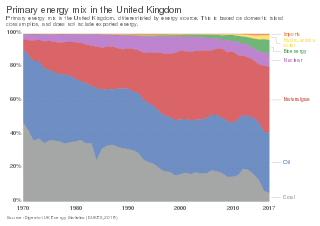| Department overview | |
|---|---|
| Formed | 8 January 1974 |
| Preceding Department | |
| Dissolved | 11 April 1992 |
| Superseding agency |
|
| Jurisdiction | United Kingdom |
| Headquarters | 1, Victoria Street, London [1] |
| Ministers responsible |
|
The Department of Energy was a department of the United Kingdom Government. The department was established in January 1974, when the responsibility for energy production was transferred away from the Department of Trade and Industry in the wake of the 1973 oil crisis and with the importance of North Sea oil increasing.
Following the privatisation of the energy industries in the United Kingdom, which had begun some ten years earlier, the department was abolished in 1992. [2] Many of its functions were abandoned, with the remainder being absorbed into other bodies or departments. The Office of Gas Supply (Ofgas) and the Office of Electricity Regulation (OFFER) took over market regulation, the Energy Efficiency Office was transferred to the Department of the Environment, and various media-related functions were transferred to the Department of National Heritage. The core activities relating to UK energy policy were transferred back to the Department of Trade and Industry (DTI).
The Department of Energy was a significant source of funding for energy research, and for investigations into the potential for renewable energy technologies in the UK. [3] Work funded or part-funded by the department included investigations into Geothermal power and the Severn Barrage [4]
Colour key (for political parties):
Politicians: Conservative Labour
| Name | Term of office | Political party | Prime Minister | ||||||
|---|---|---|---|---|---|---|---|---|---|
| Lord Carrington | 8 January 1974 | 4 March 1974 | Conservative | Edward Heath | |||||
| Eric Varley | 5 March 1974 | 10 June 1975 | Labour | Harold Wilson | |||||
| Tony Benn | 10 June 1975 | 4 May 1979 | Labour | ||||||
| James Callaghan | |||||||||
| David Howell | 5 May 1979 | 14 September 1981 | Conservative | Margaret Thatcher | |||||
| Nigel Lawson | 14 September 1981 | 11 June 1983 | Conservative | ||||||
| Peter Walker | 11 June 1983 | 13 June 1987 | Conservative | ||||||
| Cecil Parkinson | 13 June 1987 | 24 July 1989 | Conservative | ||||||
| John Wakeham | 24 July 1989 | 11 April 1992 | Conservative | ||||||
| John Major | |||||||||
| Department abolished 1992. Functions transferred to the Department of Trade and Industry. | |||||||||
Junior ministers included Peter Morrison (Minister of State in 1987) and Patrick Jenkin.
Although only formed in 1974, the Department of Energy was not the first ministry to handle energy-related matters. The Ministry of Fuel and Power was created on 11 June 1942 from functions separated from the Board of Trade. It took charge of coal production, allocation of supplies of fuels, control of energy prices and petrol rationing during World War II.
The Ministry of Fuel and Power was renamed the Ministry of Power in January 1957. The Ministry of Power later became part of the Ministry of Technology on 6 October 1969, which merged into the Department of Trade and Industry on 20 October 1970.
The post of Secretary of State for Energy was re-created in 2008 as the Secretary of State for Energy and Climate Change.
The Renewables Obligation (RO) is designed to encourage generation of electricity from eligible renewable sources in the United Kingdom. It was introduced in England and Wales and in a different form in Scotland in April 2002 and in Northern Ireland in April 2005, replacing the Non-Fossil Fuel Obligation which operated from 1990.
British Energy was the UK's largest electricity generation company by volume, before being taken over by Électricité de France (EDF) in 2009. British Energy operated eight former UK state-owned nuclear power stations and one coal-fired power station.

Energy policy is the manner in which a given entity has decided to address issues of energy development including energy conversion, distribution and use as well as reduction of greenhouse gas emissions in order to contribute to climate change mitigation. The attributes of energy policy may include legislation, international treaties, incentives to investment, guidelines for energy conservation, taxation and other public policy techniques. Energy is a core component of modern economies. A functioning economy requires not only labor and capital but also energy, for manufacturing processes, transportation, communication, agriculture, and more. Energy planning is more detailed than energy policy.

The energy industry is the totality of all of the industries involved in the production and sale of energy, including fuel extraction, manufacturing, refining and distribution. Modern society consumes large amounts of fuel, and the energy industry is a crucial part of the infrastructure and maintenance of society in almost all countries.

Microgeneration is the small-scale generation of heat and electric power by individuals, small businesses and communities to meet their own needs, as alternatives or supplements to traditional centralized grid-connected power. Although this may be motivated by practical considerations, such as unreliable grid power or long distance from the electrical grid, the term is mainly used currently for environmentally-conscious approaches that aspire to zero or low-carbon footprints or cost reduction. It differs from micropower in that it is principally concerned with fixed power plants rather than for use with mobile devices.

The energy policy of the United States is determined by federal, state, and local entities in the United States, which address issues of energy production, distribution, and consumption, such as building codes and gas mileage standards. Energy policy may include legislation, international treaties, subsidies and incentives to investment, guidelines for energy conservation, taxation and other public policy techniques. Several mandates have been proposed over the years, such as "gasoline will never exceed $1.00/gallon" (Nixon), and "the United States will never again import as much oil as it did in 1977" (Carter), but no comprehensive long-term energy policy has been proposed, although there has been concern over this failure. Energy policy acts have been passed in 1992, 2005, 2007, 2008, and 2009 which include many provisions for conservation, such as the Energy Star program, and energy development, with grants and tax incentives for both renewable energy and non-renewable energy.
Nuclear power in the United Kingdom generated 16.1% of the country's electricity in 2020. As of August 2022, the UK has 9 operational nuclear reactors at five locations, producing 5.9 GWe. It also has nuclear reprocessing plants at Sellafield and the Tails Management Facility (TMF) operated by Urenco in Capenhurst.

The energy policy of the United Kingdom has achieved success in reducing energy intensity, reducing energy poverty, and maintaining energy supply reliability,in a certain manner.The United Kingdom has an ambitious goal to reduce carbon dioxide emissions for future years, but it is unclear whether the programs in place are sufficient to achieve this objective. Regarding energy self sufficiency, the United Kingdom policy does not address this issue, other than to concede historic energy self sufficiency is currently ceasing to exist.

The Climate Change and Sustainable Energy Act 2006 is an Act of the Parliament of the United Kingdom which aims to boost the number of heat and electricity microgeneration installations in the United Kingdom, so helping to cut carbon emissions and reduce fuel poverty.
The Ministry of Power was a United Kingdom government ministry dealing with issues concerning energy.

Energy security is the association between national security and the availability of natural resources for energy consumption. Access to (relatively) cheap energy has become essential to the functioning of modern economies. However, the uneven distribution of energy supplies among countries has led to significant vulnerabilities. International energy relations have contributed to the globalization of the world leading to energy security and energy vulnerability at the same time.
The Office of Energy Efficiency and Renewable Energy (EERE) is an office within the United States Department of Energy. Formed from other energy agencies after the 1973 energy crisis, EERE is led by the Assistant Secretary of Energy Efficiency and Renewable Energy, who is appointed by the President of the United States and confirmed by the U.S. Senate. Kelly Speakes-Backman was appointed Acting Assistant Secretary in January 2021.

Renewable energy commercialization involves the deployment of three generations of renewable energy technologies dating back more than 100 years. First-generation technologies, which are already mature and economically competitive, include biomass, hydroelectricity, geothermal power and heat. Second-generation technologies are market-ready and are being deployed at the present time; they include solar heating, photovoltaics, wind power, solar thermal power stations, and modern forms of bioenergy. Third-generation technologies require continued R&D efforts in order to make large contributions on a global scale and include advanced biomass gasification, hot-dry-rock geothermal power, and ocean energy. As of 2012, renewable energy accounts for about half of new nameplate electrical capacity installed and costs are continuing to fall.

The United States produced 5.2 billion metric tons of carbon dioxide equivalent greenhouse gas (GHG) emissions in 2020, the second largest in the world after greenhouse gas emissions by China and among the countries with the highest greenhouse gas emissions per person. In 2019 China is estimated to have emitted 27% of world GHG, followed by the United States with 11%, then India with 6.6%. In total the United States has emitted a quarter of world GHG, more than any other country. Annual emissions are over 15 tonnes per person and, amongst the top eight emitters, is the highest country by greenhouse gas emissions per person. Because coal-fired power stations are gradually shutting down, in the 2010s emissions from electricity generation fell to second place behind transportation which is now the largest single source. In 2020, 27% of the GHG emissions of the United States were from transportation, 25% from electricity, 24% from industry, 13% from commercial and residential buildings and 11% from agriculture. These greenhouse gas emissions are contributing to climate change in the United States, as well as worldwide.
Energy subsidies are measures that keep prices for customers below market levels, or for suppliers above market levels, or reduce costs for customers and suppliers. Energy subsidies may be direct cash transfers to suppliers, customers, or related bodies, as well as indirect support mechanisms, such as tax exemptions and rebates, price controls, trade restrictions, and limits on market access.

Energy laws govern the use and taxation of energy, both renewable and non-renewable. These laws are the primary authorities related to energy. In contrast, energy policy refers to the policy and politics of energy.

The energy policy of Malaysia is determined by the Malaysian Government, which address issues of energy production, distribution, and consumption. The Department of Electricity and Gas Supply acts as the regulator while other players in the energy sector include energy supply and service companies, research and development institutions and consumers. Government-linked companies Petronas and Tenaga Nasional Berhad are major players in Malaysia's energy sector.

The energy transition is the ongoing process of replacing fossil fuels with low carbon energy sources. More generally, an energy transition is a significant structural change in an energy system regarding supply and consumption.

The secretary of state for business, energy and industrial strategy, also referred to as the business secretary, is a secretary of state in the Government of the United Kingdom, with overall responsibility for the Department for Business, Energy and Industrial Strategy. The incumbent is a member of the Cabinet of the United Kingdom, tenth in the ministerial ranking.

The Ministry of Energy is an executive body of the Government of Kazakhstan, which carries out state administration in the field of energy. The Ministry was created during the reorganization of the government on 6 August 2014. The Ministry's functions and powers was from the Ministry of Oil and Gas, Ministry of Industry and New Technologies and the Ministry of Environment and Water.